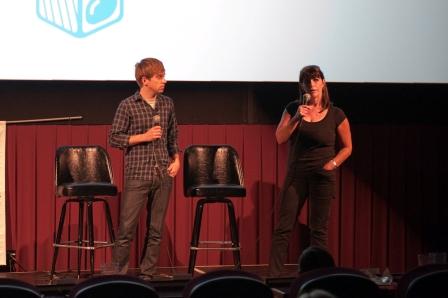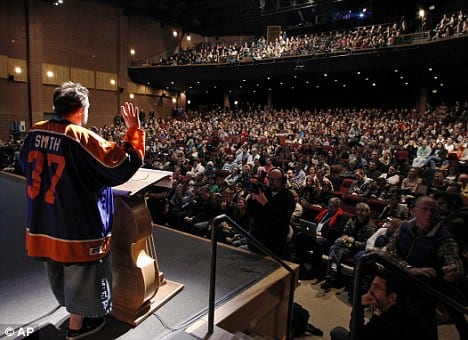Making the Most of Your Festival Experience Part Three: Your Premiere & “What’s Next?”
by Basil Tsiokos on February 25, 2011 in Festival Strategy

Director Cameron Yates and documentary subject Jeanette Maier during the Q&A for The Canal Street Madame at its SXSW Premiere, 2010
Dear Filmmakers:
This post wraps up my thoughts on how you can maximize your film’s festival premiere for the good of your film, and for your career. Part one addressed prep work while part two covered some aspects of attending the festival. This post focuses largely on your actual premiere and how you can best position yourself to have successful screenings and interactions with audiences.
Be prepared for your premiere. If your film deals with controversial subject matter, make sure you can speak intelligently about why you’ve chosen to tackle that issue. Run through hardball questions with your trusted advisors, crew, loved ones, etc. Don’t over-practice so everything you say sounds canned, but remind yourself of the key points you want to argue that are likely to come up. If you’re a documentary maker, don’t get so lost in your own stress about the premiere that you forget about your film’s subjects. If they’re traveling with you, make sure that they’re being taken care, are having a good time, are dealing with their own anxiety around their stories being told, and are prepared for public scrutiny. If you’re a narrative filmmaker, don’t forget about your cast and your writer. For all filmmakers, don’t forget about your crews in general – directors tend to get all the perks and attention at festivals, but this is also a premiere for the people who have worked hard for you to realize your vision. Film is collaborative – don’t lose sight of that. Make sure that the various members of your team are acknowledged in an appropriate manner.
Part of being prepared for your premiere is knowing how best to handle the question “what’s next for you?” This is especially true for shorts makers. You might have a really kick-ass short that everyone’s talking about, but given the limited marketplace for shorts distribution in the US or online efforts, there may not be much you can do with your film after your premiere aside from riding out the festival circuit. If you’re a shorts maker and you want to keep making shorts, that’s of course fine. Have your next short lined up and be ready to talk about it. There’s not a ton of resources out there, but you never know – someone who sees your current film may be in the position to help secure financing for your next short, so be prepared to pitch your next project when asked “what’s next?”
On the other hand, if “what’s next” is potentially a feature, then you had better have a script in your back pocket, and a 30 second pitch that you can deliver automatically. I won’t be surprising anyone by saying that the film industry is a fickle beast with a short attention span. If you’ve managed to get noticed for your imaginative 10-minute short at this festival, exploit that notice immediately. Let your suitors know that you’re not a one-trick pony, and that you could get started on your next project as soon as some angel fronts the money. Set up meetings – not just about the present film but about the other ideas floating around in various stages in your mind. Before the festival, practice your pitch. Develop some loglines and treatments. Have these at the ready when you meet with someone who may be in a position to help you.

Director Kevin Smith addresses the crowd at the Eccles Theatre at the premiere of Red State, 2011 Sundance Film Festival
This should go without saying, but you’d be surprised – if you’re at the festival, it’s your responsibility to be at every single one of your screenings. Period. Not just your premiere screening. I don’t care if it’s at 8:30am or 11:59pm – sleep and parties can wait. It’s of the utmost importance that you are physically at the screening representing your film and interacting with the audience. You never know who might be in that audience – perhaps a higher-level industry exec whose junior acquisition person clued her in to take a look after seeing the film at a previous screening. But that’s almost beside the point – the fifth audience for your film at Sundance should be afforded the same opportunity to ask you questions as the first audience had, regardless of if they can purchase your film or not.
Have a plan in place for how to manage invitations to other film festivals/series – depending on the film festival you’re attending, it may draw programmers from other events or perhaps from local film societies, museums, or institutions. Some of these programmers may be on strict deadlines and looking to fill holes in their schedules, and they may really want your film – but don’t let their urgency force you into making hasty decisions about your film’s festival plan. These programmers may have wonderful festivals, but agreeing to screen at them while you’re coming down off your first Q&A does not give you appropriate time to consider if those fests are the best move for your film – you could be agreeing to screen at a smaller festival in the same city in which you’d love to screen at a larger festival. Don’t commit in these situations – instead, accept their compliments, thank them for their interest in the film, and exchange business cards, or, ideally, put them in touch with the member of your team who is handling festival strategy to see if they can work something out.
As a corollary to attending your screenings, make sure you can handle criticism in an appropriate manner. Ideally, everyone will love your film, you’ll get fantastic reviews in Variety and The Hollywood Reporter, indieWIRE will love you, etc. But it’s not an ideal world – some critics, and some audience members for that matter, may not like your film. They might write negative things, or even say negative things in public. If you let a bad review incapacitate you, you’re just hurting yourself. If you lash out in a public way, you risk making yourself look bad. Try to take criticism with a grain of salt and remain gracious. Try not to complain in a public setting, because, honestly, you never know who’s around, or who they might know. Acknowledge that tastes are subjective and focus on the positive responses you get instead.
In addition to attending all of your own screenings, you should watch other filmmakers’ films. Take a step outside of yourself and your film, give yourself some breathing room, and remind yourself what you appreciate about filmmaking by seeing someone else’s project. Beyond giving yourself a mental break, this educates you on what other work is out there. You might spot the talent of a new actress or cinematographer who you might want to work with in the future. You may discover that another filmmaker has already developed that germ of an idea for your next documentary project that’s been rolling around in your head for the past few months. Attending other filmmakers’ films also puts you in the position of participating in the key social aspect of the event – the communal experience of cinema-going. You should stand in line or sit in theatres with audience members – the general public, other filmmakers, other festival programmers, the press, etc – and discuss what you’ve been up to so far in a casual setting. This can help you promote your work, but also make real human connections outside of the more structured setting of a theatre Q&A.
As you near the end of your time at the festival, make sure to thank the efforts of the festival staff that you’ve worked closely with – your hospitality coordinator or filmmaker liaison – as well as the festival programming staff who selected your film in the first place. When you get back home, send them a thank you. Ask that they let you know if any industry shares feedback with them. Request links to festival press coverage that mentions your film. Generally, try to leave a good impression, and position yourself as a filmmaker that the festival organizers think fondly about. Festival staffs talk to one another – they’re more than happy to report about the diva antics of a crazy filmmaker – you don’t want to be that filmmaker. Instead be the one that they all agree was a pleasure to have in attendance – the one whose next project they want to make sure to see, and, potentially, to program.
